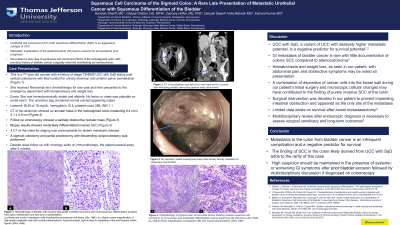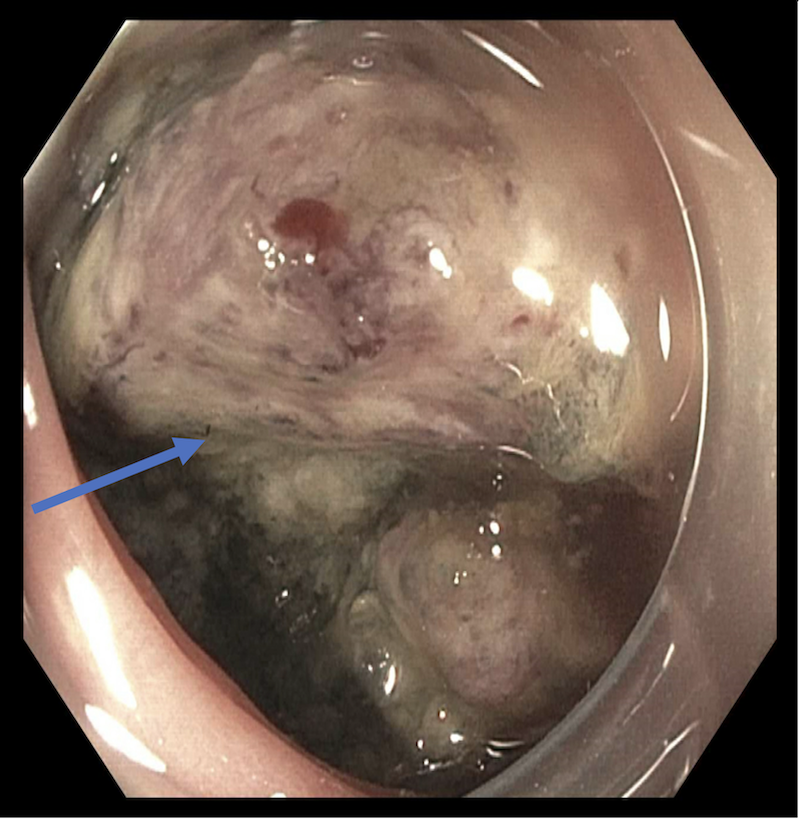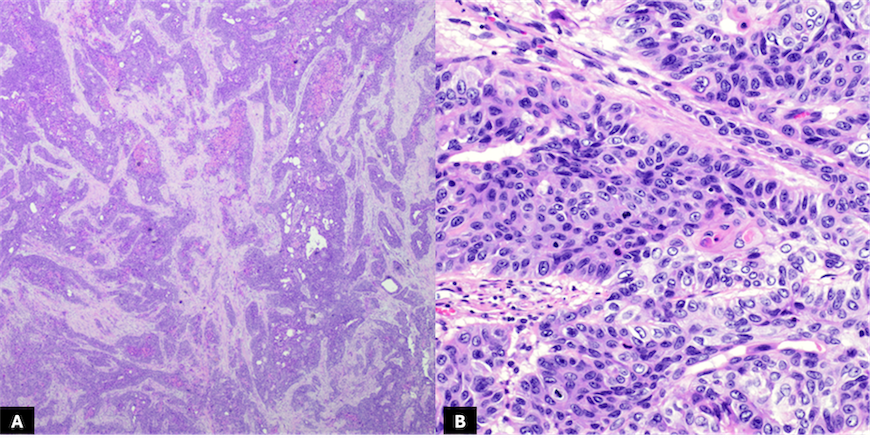Sunday Poster Session
Category: Colon
P0354 - Squamous Cell Carcinoma of the Sigmoid Colon: A Rare Late Presentation of Metastatic Urothelial Cancer With Squamous Differentiation of the Bladder

- HS
Hamzah Shariff, MD
Thomas Jefferson University Hospital
Philadelphia, PA
Presenting Author(s)
1Thomas Jefferson University Hospital, Philadelphia, PA; 2Geisinger Health System, Danville, PA; 3Geisinger Commonwealth School of Medicine, Scranton, PA; 4Geisinger Community Medical Center, Scranton, PA
Introduction:
Urothelial cell carcinoma (UCC) with squamous differentiation (SqD) is an aggressive subtype of UCC. Metastatic implantation of the gastrointestinal (GI) tract is uncommon and portends poor prognosis. We present a rare case of squamous cell carcinoma (SCC) of the rectosigmoid colon with previous history of bladder cancer surgically removed manifesting as hematochezia.
Case Description/Methods:
This is a 77-year-old female with a history of stage T3N0M0 UCC with SqD status post radical cystectomy with ileal conduit for urinary diversion and anterior pelvic exenteration treated with Nivolumab for one year. She then presented to the emergency department with hematochezia and weight loss. She was hemodynamically stable and afebrile. No lesion or mass was palpable on rectal exam. The urostomy bag contained normal colored appearing output. Initial labs showed a hemoglobin of 10.6. A CT of the abdomen showed an annular rectosigmoid mass in the sigmoid colon measuring 6.4 cm x 3.1 x 4.9 cm. Follow up colonoscopy showed a partially obstructive nodular mass (Figure 1). Biopsy results showed moderately differentiated invasive SCC (Figure 2). A CT of the chest for staging was unremarkable for distant metastatic disease. A sigmoid colectomy and partial proctectomy with descending coloproctostomy was performed. Despite close follow up with oncology while on immunotherapy, the patient passed away after 6 months.
Discussion:
UCC with SqD is a variant of UCC with relatively higher metastatic potential. GI metastasis of bladder cancer is rare with little documentation of colonic SCC compared to adenocarcinoma. Hematochezia and weight loss, as seen in our patient, with abdominal pain and obstructive symptoms may be noted on presentation. A combination of deposition of cancer cells into the bowel wall during our patient’s initial surgery and microscopic cellular changes may have contributed to the finding of purely invasive SCC of the colon. Limited data exist on survival after bowel metastasectomy. Multidisciplinary review after endoscopic diagnosis is necessary to assess surgical candidacy and long-term outcomes.
Metastasis to the colon from bladder cancer is an infrequent complication and a negative predictor for survival. The finding of SCC in the colon likely derived from UCC with SqD adds to the rarity of this case. High suspicion should be maintained in the presence of systemic or worsening GI symptoms after prior bladder excision followed by multidisciplinary discussion if diagnosed on colonoscopy.


Disclosures:
Hamzah Shariff, MD1, Ghazal Ghafari, DO, MPH2, Zachary Hoffer, MD, PhD2, Danyall Saeed, MSc3, Anila Mahesh, MD4, Kishore Kumar, MD4. P0354 - Squamous Cell Carcinoma of the Sigmoid Colon: A Rare Late Presentation of Metastatic Urothelial Cancer With Squamous Differentiation of the Bladder, ACG 2025 Annual Scientific Meeting Abstracts. Phoenix, AZ: American College of Gastroenterology.
